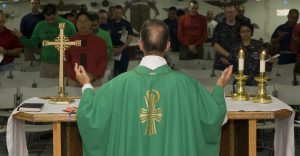On the PTS Blog, we invite alumnae/i to share reflections, stories, and practical tips from their ministry experience. This week, the Rev. B.T. Gilligan ’11 offers advice on cultivating a congregation’s healthy relationship with the practice of financial stewardship from his pastoral experience at Nixon UMC.
Beyond the Dreaded “Fall Pledge Drive”
As a 2011 alumnus of PTS, I currently serve Nixon UMC in the Butler, Pa. area. I’ve been serving here since 2017, and I’ve learned a few things that might be helpful in going beyond the typical ideas surrounding stewardship campaigns and that awkward “fall pledge drive” event that leaves the whole congregation feeling gross.
Leading a stewardship campaign is a complex task. It’s a balancing act of being biblical, faithful, and honest without giving people a guilt trip. Our goal is not to make anyone feel uncomfortable but to foster a sense of community and shared responsibility. Oftentimes, it can feel like we’re standing there with our hands out, asking for scraps from the very people we serve.
So, what can we do to help eliminate the awkward feelings around stewardship?
#1 Stewardship Is Not a One-Time Event
We cannot accomplish good stewardship with a single Sunday sermon or even a four-week sermon series on giving. Instead, stewardship is about consistency. Within the congregation, stewardship must be a regular reference. This means bringing up the importance of stewardship every week, preferably before passing the offering plate. This can be as simple as saying, “Your faithful support of the church’s ministries allows us to continue our ministry.” It can be as big as having someone who benefits from the offering stand up and thank the congregation. Whatever way it is done, the important element is consistency.
#2 Stewardship Must be Specific to Your Context
If your congregation is mostly retired folks on fixed incomes, a sermon about giving 10 percent of income will not resonate. Similarly, if your congregation is affluent, a “give what you can” approach will not be effective. No Internet-purchased stewardship campaign can understand your context as well as you do. A context-specific understanding of stewardship will make your congregation feel understood and catered to. This also means that one of the worst ideas is to bring in a “special guest preacher” who tries to scare people into good stewardship.
#3 Stewardship Must Be Grounded in the Gospel
It can be said that the entirety of the Church should be based on the gospel, and this includes stewardship. One guiding question for stewardship is: “If someone showed up on stewardship Sunday and were not a Christian, would they follow Jesus based on that service?”
# 4 Leadership Sets the Example
All leaders, clergy included, will always set the example for stewardship. When the leadership does not give, the congregation will not give. Every approach to stewardship will only succeed if the leadership is leading the way in stewardship. It isn’t about giving at a specific level, but it is about being sure to back up the teaching with our own actions. The leadership doesn’t need to talk about their giving; word will still get out. People will always know. When the leaders give, it will provide authenticity and credibility to all teaching, including teaching regarding stewardship.
These pieces make stewardship more work and more complicated, but hopefully, they will also make our stewardship more successful.
 The Rev. B.T. Gilligan is senior pastor at Nixon UMC, where he has served since July 2017. He graduated from Indiana University of Pennsylvania with a degree in criminology and religious studies in 2004 and earned his master of divinity degree from Pittsburgh Theological Seminary in 2011. He is currently a student at Dakota Weslyan University pursuing a master’s in business administration. B.T. lives in Penn Township with his wife, Lisa, and four children Samuel, Olivia, Elliott, and Gabriel. In his spare time, he enjoys skiing, craft beer, running, and playing Magic: The Gathering.
The Rev. B.T. Gilligan is senior pastor at Nixon UMC, where he has served since July 2017. He graduated from Indiana University of Pennsylvania with a degree in criminology and religious studies in 2004 and earned his master of divinity degree from Pittsburgh Theological Seminary in 2011. He is currently a student at Dakota Weslyan University pursuing a master’s in business administration. B.T. lives in Penn Township with his wife, Lisa, and four children Samuel, Olivia, Elliott, and Gabriel. In his spare time, he enjoys skiing, craft beer, running, and playing Magic: The Gathering.
Read Next







